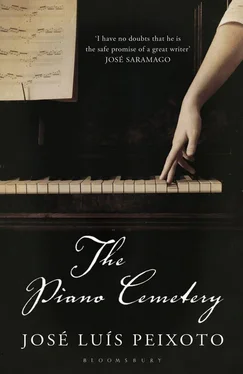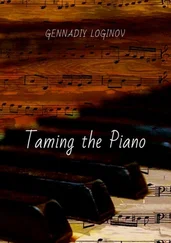with possibilities and contradictions. My brother arrived mid-morning. No sooner had I heard his steps on the earth of the entrance hall than I put down my tools and moved away from the carpentry bench. When he reached the carpentry shop I was shaking the sawdust from my trousers and the sleeves of my sweater. As he took three steps into the carpentry shop, opening his mouth, before he’d said a word I was past him, saying, ‘I’ve got to go out, I won’t be long.’ He turned his whole head to watch my back with his wide-open left eye. Benfica was alive. Carts and motorcars passed, people passed, pigeons passed.
as though I had brought my hands too close to the fire, almost touching it, as though my whole body, this body, was my hands
passed by my sister Maria’s street. It was late afternoon. There weren’t many days left before I was off. My mother was at the window waiting for me, holding Íris in her arms, and as I passed she held her little hand at the wrist and they waved to me. From my mother’s face, from her smile, I could tell that she was proud of me. It didn’t take me long to reach São Sebastião de Pedreira. I was still taking it easy when I turned back. As far as Benfica, high on hope, I overtook every motorcar I met. I passed my sister Maria’s street again. I couldn’t make out any movement in the light beyond the window and the tulle curtains. I wanted to imagine that on that day my sister wouldn’t fight with our mother, nor with her husband. I could remember when Maria and our mother started fighting about something or other. They’d begin by saying casual words, things that they didn’t feel, hurting one another. Then they’d put on their tearful voices, accusing one another, and they might bring Maria’s husband into the argument or they might bring in the children, Ana and Íris, who were also crying or who stayed together, hand in hand. I could remember when Maria and her husband started fighting. She might — or not — say two or three things that insulted him, or accused him. He’d start pushing her, or throwing plates on the floor, throwing glasses. Once, using his two hands, he split the porcelain tureen that had always adorned the centre of the kitchen table. Ana and Íris cried, or just stayed together, hand in hand. As I ran past I imagined that, on that day, neither Maria, nor her husband, nor our mother would fight. Two or three times a week I used to stop by, drink a glass of water and see if everything was all right. But that wasn’t a day for stopping. That was a day to run and not stop.
Kilometre twenty-four
didn’t smile. She had the frightened, hurt, worried expression that she’d shown me at the workshop a little over an hour earlier, but she was still distant. A distant lady. I followed her along the corridor. I’d known the way for a long time, but there was a pattern that we couldn’t change, it was too late. For her I’d always be the image that I myself didn’t know, millimetrically exact. We snaked our way along the hall in silence. Our steps were quick, there was a breeze that passed us, that we passed through. We reached the doors to the big hall. When she opened them in front of me, there was what I’d expected to see and there was what I saw — the piano, burned, destroyed, without legs, set on the floor. The walls near the piano were black with soot. The ceiling above the piano was black. The carpet around it was burned. I walked over, incredulous, and bent down to look at the piano which was almost completely burned up, its grey insides crossed by pieces of blackened metal, the sheets of wood that were still cooling off as embers, the surface of the varnish deformed by blisters where the wood hadn’t been incinerated completely. Behind me the lady was a small, thin, old statue, and I didn’t need to ask her any questions. I could imagine the moment when she hurled the lit oil lamp on to the piano. I could imagine the despair. I could imagine her standing there, her face turned to the piano in flames. The white skin of her face lit up by the flames. I could imagine the strings snapping inside the fire. I don’t know what the lady expected me to say. I said nothing. I walked along the corridor alone, knowing that somewhere in the house she was there — the body I loved, the skin I knew completely, that I still know. The streets of Benfica didn’t exist. I arrived at the workshop, went into the carpentry shop and Simão, absorbed in his thoughts, was startled at the speed of my return. Without letting him catch his breath, I asked him, ‘Can we go and see the piano you were talking about yesterday?’ In wonder, he looked at me with his left eye as if to say yes, as if not to say no. I grabbed him by the arm and we went out. I closed the big door and we walked together. He explained to me what it was like, the piano, the condition it was in. I didn’t hear him.
the air boiling as it comes into me. I breathe boiling air
night was beginning on all the streets. In the kitchen my wife had her arms stretched out over the pan. Her pregnant belly meant that she had to keep this distance to shred parsley, coriander or any kind of herb. Having lost track of time, she said to me, ‘You’re here already?’ I walked towards her to kiss her. As my lips approached and my chin ran along the skin of her shoulder, she shrugged her shoulder against her neck and with words broken by giggles she repeated, ‘I don’t want any sweaty kisses here, go and wash first.’ But I kissed her, I kissed her again, and my kisses reached the surfaces of her skin that while she laughed she couldn’t hide.
and I see the other runners in the distance. Like me, they’re being punished. I know that they also used to be children who ran without fear. They were young lads, and they believed. In other places time has stopped for them, too, when their lips met lips. All over the world, in squares, on staircases, in tunnels, on bridges, the simple gesture of lips getting closer, skin that begins to touch at the threshold of its outlines, that joins, slowly and completely, and remains, skin against skin, lips lips; all over the world, under many, so different trees, under the ringing of so many bells, on the banks of rivers big and small, locks of hair that touch a cheek, the strength of a face felt by another face, the taste; all over the world, people of all sizes and all races, houses of wood and stone, gardens, the warm weight of eyelids over eyes, breathing that touches skin, lips lips, morning or afternoon or night or now, fields, cities, people, two people, the whole world frozen for two people all over the world. In the distance, the back of a runner. Now it’s as though it were simple
love you too much, almost too much, I love you too much, almost too much
sisters. Marta never spoke to Maria about that afternoon in the piano cemetery. There was a single Sunday lunch at our parents’ house when Marta, angry and hurt, ignored Maria. Then straight away they went back to being as they had always been. Marta knew how to forgive, and she made herself forget. When Maria arrived to see Elisa, who was still small, Marta smiled at her and they were just sisters, ever sisters. It happened sometimes while Elisa was taking her nap, or when she was spending the evening alone, that the memory of that afternoon came to her. For a moment the image of her husband’s face, between pianos, behind pianos, and her sister’s back. For a moment, again, the image of her husband’s head sinking into the neck of her sister. Marta, alone, grimaced and fled from this image, ate a whole pan of boiled potatoes, roasted a pork sausage. With no one else there she would walk through the house’s enormous afternoons. Her husband would come in, and go out. Maria would follow him with her eyes, go after him, try to talk to him in a sweet voice, but he wouldn’t stop, wouldn’t wait for her, didn’t see her, didn’t hear her. In the morning, when her husband had already gone out, when Elisa was still asleep, Marta would stand in front of the mirror. With the tips of her fingers she would move aside the straps and let her nightdress drop to her feet. And she would look at her body — the thick skin enveloping shapes of stone that grew in extravagant ways. In a few months her body was deformed. When I arrived, I was able to make her laugh. Between our conversations, between the little games with Elisa, I witnessed the changes to her body. My mother would arrive to see her granddaughter and witnessed the changes to her body. Simão, when he turned up to see her, witnessed the changes to her body. My father, Maria, all of us witnessed the changes to her body, but we said nothing. On Sundays, when Marta arrived bringing Elisa by the hand, when her husband arrived a few minutes later and we all sat down at the table for lunch, no one commented on the way Marta held blocks of pork and gnawed at them, quickly, one after another with her lips greasy and her eyes getting smaller and smaller, sunk in her round face.
Читать дальше












